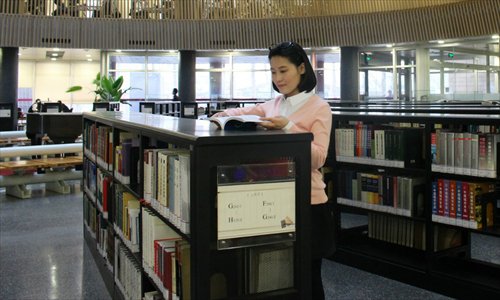HOME >> CHINA
Student tackles dishonest food manufacturers, safety scandals
By Zhang Yu Source:Global Times Published: 2015-3-27 5:03:02

Chen Qiaoling reads a book at a library in Tsinghua University. Photo: Courtesy of Chen Qiaoling
In 2012, on the 101st anniversary of the founding of Tsinghua University, Chen Hongrong, an alumnus of the university, asked Chen Qiaoling, then a second-year MBA student, what she wanted to do after graduation.
"I told him I wanted to secure a good job, buy an apartment, a car, and if I'm lucky enough, get a Beijing hukou," Chen said, referring to China's system of residential permits. She could sense Chen Hongrong's disappointment. He told her that "a Tsinghua student shouldn't be like this. They should aim higher, have spiritual pursuits and do something for society."
Several months later, the girl, who hails from a small village in East China's Shandong Province, quit her job at a private equity fund on Beijing's Financial Street, suspended her course at Tsinghua and devoted herself to an unlikely cause: together with Chen Hongrong, the two management majors founded a food safety research center, called Yueyaduo, at Tsinghua University. They dedicated themselves to raising people's awareness of food safety and providing solutions to farmers and food manufacturers that want to raise the quality of their products.
"I'm the daughter of farmers," she said, and explained that part of the reason why she set up the center was to do something for people like her parents.
"Nowadays, farmers' lives are associated with pesticides, chemicals, genetically-modified agricultural products and monocropping. Few of them know what traditional farming is like. I want to help them find a solution that can give them a higher income and rekindle their passion for farming," she wrote in an article on why she founded the research center.
While this is a long-term goal, the center is currently focused on highlighting the seriousness of food safety issues in China and raising public awareness. This March, the center published the China Food Safety Record, a compilation of food safety incidents that have occurred in China in recent years. The book consists of 26 chapters, each tackling a different theme, from soil and water pollution and their impact on food safety to fatally tainted infant formula, from fake honey to the lean meat powder that helps keep aging pork looking fresh.
A complex problem
I met Chen, a jovial girl, in a cafeteria on the Tsinghua campus. She was eating breakfast from the school canteen and greeted me by giving me a sachet of yoghurt.
"You might want to try this. Its made with only three ingredients: milk, sugar and lactobacillus. Pretty safe," she said with a smile, pointing at the ingredient information on the package.
Two years of research into food safety issues has made her sensitive to the smell, color and composition of foods. "I'm now used to smelling things before I buy them," she said.
After Chen established the research center, over 20 volunteers joined and contributed research to the latest book, none of whom had majored in food-related sciences. Chen said, "There have already been lots of studies on the chemicals involved in food scandals. Our book doesn't involve any groundbreaking discoveries or new exposures of food scandals, but is written as a popular reader to get people to pay attention to the issue."
After working for two years with the center, she resumed her schooling last year. During that time, Chen and her partners visited farmers, food manufacturers, street vendors and restaurant owners in nine provinces including Henan, Hebei and Shandong and observed how they maintained their food safety standards.
"We realized that food safety is a complicated social problem. It involves a series of issues, including soil and water pollution, the quality of agricultural goods, logistics, and people's honesty, among other things. From an economic angle, we wanted to find out what motivates food manufacturers and farmers to tamper with food quality, and possibly provide them with solutions and guide them not to fake things," she said.
"The most critical issue is probably the lack of honesty in the food industry. More than one food manufacturer told me that being ethical means they will lose an edge in their competition against dishonest manufacturers, because their prices are always lower," she said.
Hunger for change
After the book was finished, Chen's team posted it online for free and only published 200 hard copies, as they had not initially intended to put it on the market. But demand surged after the local media reported on her book. One company ordered dozens of books from her, and she received a call from China's Food and Drug Administration, who asked her to send them a few copies.
The center is now preparing their next book, which will look at the organic food industry in China. "While our first book was more about the dark side of China's food industry, with our next book we want to promote the good cases," she said. In a separate initiative, she plans to set up a platform to connect concientious food manufacturers with customers. While the business model is yet unclear, she believes the platform will act as a way to help Chinese consumers choose safe food.
While talking about her role models, she refers to Harvey Wiley, an American chemist who studied the effects of preservatives on human beings and drew national attention to the need for the US to adopt federal food and drug laws. Partially due to Wiley's advocacy, the Pure Food and Drug Act was signed into law in 1906. "I think there has to be someone like him in China."
And Chen has now changed her plan after graduation. Instead of the car, apartment hukou plan, she says she will "devote myself to promoting food safety."
Newspaper headline: Food fighter
Posted in: Profile